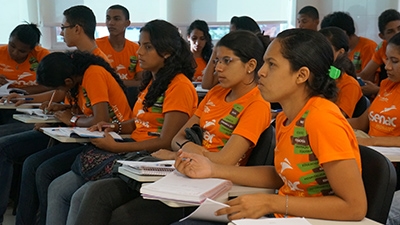It’s Thursday afternoon in Teresina, Brazil. While outside there is heat and noise, within Senac classrooms in Piauí, hundreds of students enjoy silence and the coolness of air-conditioning. Many are enrolled in the Federal Government's Bolsa Família program.
They use the benefit and additional training programs to ensure a better future for themselves. "I dream of going beyond, studying, having a good profession," says Tamires Rodrigues, 17. She and her colleagues are on the right track, for two reasons:
First: labor was largely responsible for the reduction of extreme poverty in Brazil, during the first decade of the 2000s. This data comes from the Global Development Report 2013 (i).
"For poverty reduction to occur steadily, it is crucial to promote the access of the poor to vocational training courses, labor intermediation services and microcredit" reinforces economist Joana Silva, from the World Bank .
The set of such elements is called productive inclusion. Productive inclusion, in turn, is a major pillar of the Plan Brazil Without Extreme Poverty (Plano Brasil Sem Miséria) (2011), which has the goal of lifting 16 million Brazilians out of extreme poverty by 2014.
Precarious jobs
The second reason why the low-income youth need to invest in professional training has to do with the precariousness of the jobs currently held by those who receive the Bolsa Família benefit.
As the labor market in Brazil becomes increasingly formal, their access to such jobs remains limited, as shown by a study conducted by researcher Alexander Leichsering, from the University of São Paulo (USP).
Between 2004 and 2007, only about 10% of Bolsa Família beneficiaries had held a formal job at some point. Of this total, half lost their jobs within one year of being hired.

